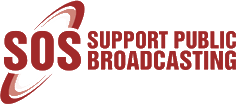Press statement: A call for mass media to contribute prime-time airtime for covid 19 public health messaging
August 11, 2021
Research Report: SABC (Mis)management Crisis In The Post-Apartheid Era
December 9, 2021Press statement: South Africa is not Prepared for the DCDT’s proposed Analogue Switch Off Date
07 October 2021
On 05 October 2021, the Department of Communications and Digital Technologies, under the leadership of Minister Khumbudzo Ntshaveni, announced a new date for Analogue Switch Off (ASO) being the end of January 2022.
The announcement further indicates that the revised integrated ASO Implementation Plan was approved by Cabinet last week.
The SOS Support Public Broadcasting Coalition, has for years been involved in lobbying for Digital Terrestrial Television (DTT) readiness which is an essential precondition to the ASO.
This is essential to ensure that the public is not cut off from essential news and information provided by the country’s free-to-air television services, namely, the SABC, e-tv and the various community television broadcasters licensed by ICASA. Further, this is essential to ensure the future viability of terrestrial free-to-air television which is a vital component of the broadcasting ecosystem.
It is our view that this new proposed date is ill-considered and will be impossible to implement without enormous damage to the public, commercial and community broadcasting sectors. Indeed, the only beneficiaries of the ASO going ahead in January 2020 will be the satellite television operators such as DStv, Starsat and OpenView HD.
Frankly, through a series of inept decisions and implementation inaction, the Department’s planned migration from analogue terrestrial broadcasting to DTT has been a dismal failure.
The bottom line is that there are less than 600 000 DTT set-top boxes being used in the country. This is out of 16 million television households as measured by the Broadcast Research Council of South Africa.
The impact of this is, simply, that 15 400 000 households will be without access to SABC 1, 2 and 3, e-tv and all community television services from the end of January 2022 unless they are lucky enough to be able to obtain the DTT set-top boxes which are not readily available commercially or already have access to satellite TV via DStv, OpenView HD or Starsat.
The majority of South Africans are working class or indigent. They access their news, information, sports content, and entertainment via free-to-air television, particularly the services of the SABC and e-tv.
We believe switching off analogue terrestrial television signals will fundamentally infringe on the right to access information and to the right to receive information and ideas which is a fundamental part of the right to freedom of expression.
We call on ICASA, as the constitutionally-mandated broadcasting regulator, to add its voice to the growing anger at the DCDT’s announcement as ICASA must be aware that insufficient migration of analogue terrestrial television households has taken place. If it supports this action on the part of the DCDT then ICASA must be held to account for failing to regulate broadcasting sector to ensure diversity and fairness as is required in terms of section 192 of the Constitution.
This rushed cutoff date, resulting from the Department’s own DTT migration failures, will particularly harm the SABC. From the perspective of the SABC’s mandate, this move will limit the extent to which this organization is able to fully carry out its public mandate. With many people still without access to set-top boxes, the SABC’s market share will be negatively impacted with devastating financial consequences due to advertisers being unable to reach their usual audiences.
In order to act in the public interest, SOS is currently in consultation with the rest of Civil Society, and our lawyers with the aim of instituting legal proceedings in the High Court to stop this hastily-imposed ASO which will do such damage to the free-to-air broadcasting sector and to the public.
For additional information contact:
Justine Limpitlaw, SOS Legal Subcommittee Chair, 082 902 2494
William Bird, 082 887 1370
